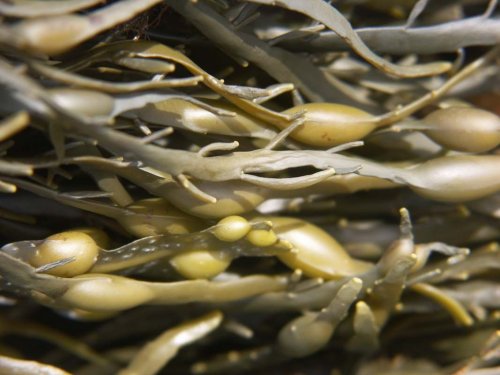
Silvia Carri
From the cold and pristine seas of the north comes Ascophyllum nodosum: a brown seaweed that can withstand bad weather and extreme environmental conditions, excellent chelator of toxins and heavy metals, guarantor of well-being for humans, plants and animals.
It’s one of the oldest plants appeared on Earth, it produces no roots, no flowers, no fruit, but receives all its nourishment from the sea. It is the Ascophyllum nodosum, a brown seaweed of the fucaceae family, which thrives in the cold and clean waters of the North Atlantic Ocean and the North Sea, in environments subject to strong environmental stresses that have favored special features to ensure survival.
Free of environmental contaminants, the Ascophyllum nodosum is a mine of anti-stress substances such as auxins, cytokinins and gibberellins, growth promoters; betaine osmoprotectors, mannitol and alginates with detoxifying effect. It also contains iodine, amino acids, antioxidants (vitamin C, beta-carotene, vitamin E, polyphenols, vitamins of the B group) and minerals (calcium, potassium, magnesium, selenium).
The focus in the collection and processing at low temperatures allow to preserve its quality. Once reduced to powder it is used as a supplement for human and animal consumption and as an excellent natural fertilizer.
A shield against overweight and intoxications
The natural wealth of this iodine bioavailable alga supports and nourishes the thyroid gland and the entire endocrine system (1), activates the metabolism and acts on all the treatment processes and the control of body weight (2). In particular the presence of alginates, united to chlorophyll, carotenoids, fucoxanthin and antioxidants, makes it suitable in aiding the elimination of toxins, heavy metals, chemical additives, environmental pollutants and radiation that tend to bind mainly to the adipose tissues (3). A research carried out in England in 2008 has also demonstrated the potential of these algae in reducing the risk of cardiovascular disease and in limiting the levels of insulin, LDL cholesterol and blood pressure (4).
Also the prebiotic effect on the intestinal flora is very important and is guaranteed once again from alginate and mannitol, which protect the intestinal mucosa and provide a good acid-base balance (the Ascophyllum is over 70 times more alkalizing than apples); it also stimulates the secretion of digestive enzymes (5) and favored the metabolism of carbohydrates, fats and proteins with immune-boosting effects (6).
This alga does not cause allergies or intolerances, and enjoys the approval of the vegan and celiac associations, it is only contraindicated in patients with hyperthyroidism.
Applications in the field of agriculture and livestock
Ascophyllum-based products are also widely used in agriculture to improve the metabolism of plants, favoring fruit set, growth, root development, and nutritional absorption of active sprouting, especially in situations of strong biotic stresses such as transplants, thermal shock and pest attacks.
Even cats and dogs benefit from the properties of this alga. It appears that supplementation of Ascophyllum is able to significantly reduce the levels of bacterial plaque and calculus of our four-legged friends, limiting the phenomenon of halitosis (7).
A bio-fabric for sensitive skin
Finally, the brainchild of designer Alberto Zanrè born a few years ago led to a natural fiber made from Ascophyllum. It is a strong, soft and absorbent tissue with an peculiar feature: once in contact with the skin it releases antibacterial precious principles with anti-inflammatory, decongestant and protective action against ultraviolet light, providing an excellent shield for sensitive skins against the damage from free radicals.





